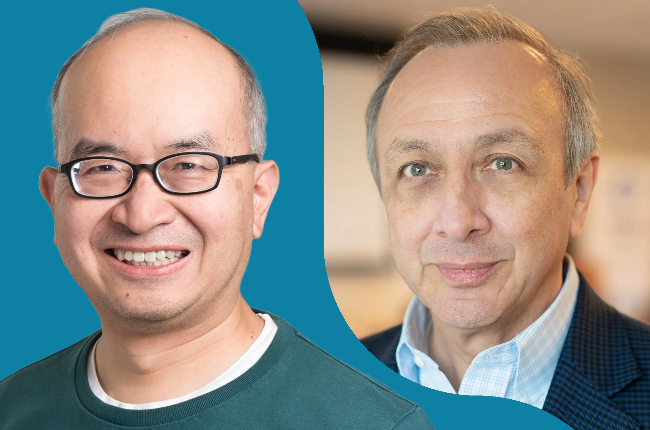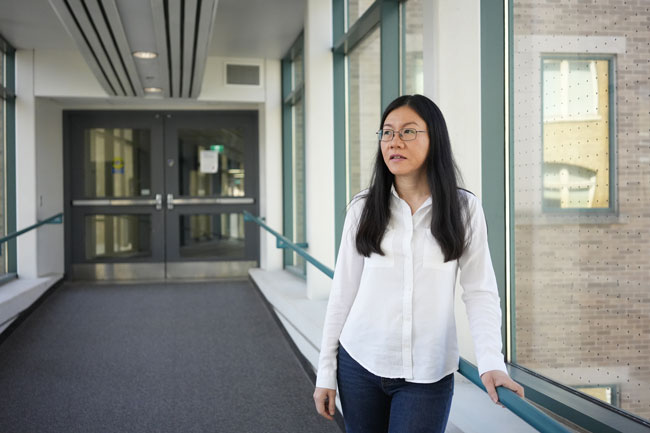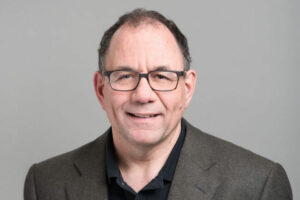
SEPTEMBER 28, 2023 • By Matthew Tierney
ECE professors Hoi-Kwong Lo and J.J. Garcia-Luna-Aceves have been selected by IEEE, the world’s largest technical professional organization, as 2023 recipients for esteemed, career-spanning awards.
Lo, who is cross-appointed to the Department of Physics, was awarded the IEEE Photonics Society Quantum Electronics Award for his research in practical quantum cryptography and quantum networks.
Professor Garcia-Luna-Aceves’s time with U of T started this July, and he arrives at ECE with decades of research in routing algorithms, protocols and architectures in computer networks, for which he was awarded the IEEE Harry H. Goode Memorial Award.
“That IEEE has chosen two professors from ECE for such prestigious awards is a testament to the breadth and strength of our department,” says Professor Deepa Kundur, Chair of ECE. “Sincere congratulations to Professors Lo and Garcia-Luna-Aceves. I’m excited to see where their leadership in their respective fields will take us.”
Lo was among the first to prove that one of the best-known applications of quantum cryptography, called quantum key distribution (QKD), is information-theoretically secure —that is, its encryption is virtually unbreakable. However, the photon detectors of early commercial QKD systems were vulnerable to attacks, and Lo performed the world's first successful quantum hack of these systems, which helped improve the technology.
Not bad for a career that began when he got sidetracked, he says.
“My PhD at Caltech was on theoretical particle physics,” says Lo. “While doing a postdoc at Princeton, I changed my research field completely to quantum computing and quantum information. That’s when I started working on theoretical computer-science-type questions, such as what quantum cryptography can or cannot do.”
Lo’s research would continue to alternate between theory and practice. One such example is the decoy state protocol that he proved would increase the efficiency and effective distance of QKD — a protocol he was the first to demonstrate in the lab with ECE professor Li Qian. Decoy state has now become a standard technique in the field.
A few years ago, Lo co-founded the start-up Quantum Bridge to design and build quantum-safe security solutions and to work on quantum repeaters, which are a key component in a future quantum internet.
“The quantum field has grown exponentially. All the tech giants are investing heavily in quantum computing, which is threatening the data security of the Internet,” says Lo. “We need to address this threat now rather than later.”
Looking back, Lo says he’s grateful for U of T for taking a chance on him.
“They hired me over twenty years ago, back when quantum computing was just an obscure intellectual curiosity, and gave me the opportunity to forge my path,” he says. “Winning this award means a lot to me and hopefully, in a small way, to U of T too.”
Just like Lo, Professor J.J. Garcia-Luna-Aceves’s work has been adopted for everyday technology, such as the routing algorithms for today’s wireless and server networks. Much of this research was done during his 30 years as a professor at University of California, Santa Cruz. He’s also worked with many influential tech companies over the years, including SRI International and Nokia.
“I have been fortunate to see some of my results in real products. Perhaps the best example of this is the Diffusing Update Algorithm, or DUAL, which I designed while at SRI,” says Garcia-Luna-Aceves.
“It has been used by Cisco for almost three decades and is still the only Internet routing protocol with quick convergence times and minimal network traffic that’s free of routing-table loops, which slow the transmission of data packets.”
Over the years, he continued to refine the speed and simplicity of routing algorithms and protocols for content-delivery networks and information-centric networks. He currently holds 70 U.S. patents and has published three books.
“I am of course very proud of my research. However, what has given me most joy is my success in sharing with my students the thrill of discovery and invention,” says Garcia-Luna-Aceves.” I am thrilled that many former students became great researchers in their own right. I would like to think my mentoring had a small part to do with that.”
Asked what the award means to him, Garcia-Luna-Aceves says he’s honoured and humbled.
“So many past award recipients made groundbreaking contributions to the information processing field, and I admire them all greatly. To know that the research community thinks that my contributions are as worthy is just incredible.”


